| This week’s stories may reflect how the Department of Natural Resources has adapted to meet customer needs and protect public health and safety. Follow our COVID-19 response page for updates on access to facilities and programs.
We’ll continue to share news and information about the best ways to discover and enjoy Michigan’s natural and heritage resources! Here’s a look at some of this week’s stories:
See other news releases, Showcasing the DNR stories, photos and other resources at Michigan.gov/DNRPressRoom.
PHOTO FOLDER: Larger, higher-res versions of the images used below, and others, are available in this folder. Arctic grayling photo courtesy U.S. Fish & Wildlife Service National Digital Library.
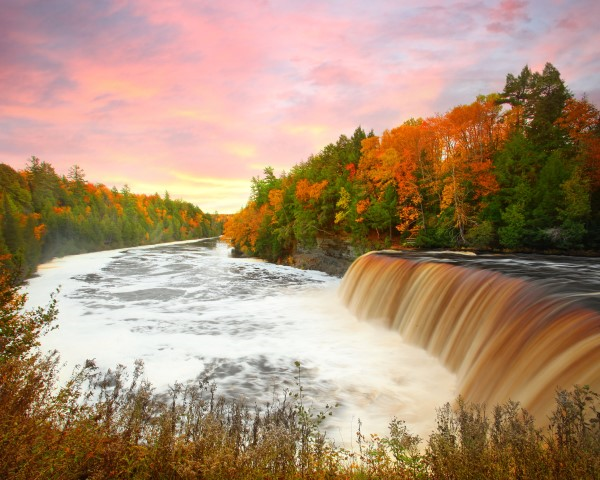 Want to see more pictures like this, taken by Michigan state parks photo ambassador Mike Sonnenberg at Tahquamenon Falls State Park in Chippewa County? Visit Instagram.com/MiStateParks to explore photos and learn more about the photo ambassadors! For more on the photo ambassador program, call Stephanie Yancer at 989-274-6182. Want to see more pictures like this, taken by Michigan state parks photo ambassador Mike Sonnenberg at Tahquamenon Falls State Park in Chippewa County? Visit Instagram.com/MiStateParks to explore photos and learn more about the photo ambassadors! For more on the photo ambassador program, call Stephanie Yancer at 989-274-6182.
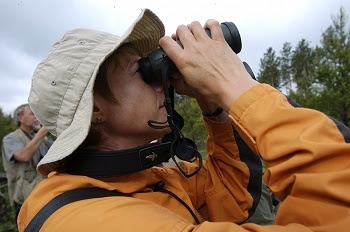 Tips on how to safely and confidently view birds and other wildlife at or near a hunting area Tips on how to safely and confidently view birds and other wildlife at or near a hunting area
Michigan’s public lands offer a great chance to see birds and other wildlife while spending quality time in the great outdoors. But maybe you’re concerned it’s not safe to hike or go birding in the woods during hunting season – the good news is hunting is a very safe sport, and, with a little knowledge and preparation, you can confidently enjoy birding during any hunting season.
Here are some tips: |
- Keep color in mind. The more visible you are, the safer you are. Wear a brightly colored piece of clothing that can be seen from all directions. Avoid wearing colors that blend in with the environment or are the color of game species: green, brown, black or white.
- Know which hunting seasons are open. There are open seasons every day of the year in Michigan. Most seasons are busiest on opening day, and many hunters stop going out after the first week. The most popular hunting season in Michigan is firearm deer hunting season, which runs Nov. 15-30 annually. Find more on Michigan’s hunting seasons online at Michigan.gov/Hunting.
- Know the lands you use. Hunting is open on any public or private land where permission is granted. Most public lands and private conservation lands have resources online to help you find out when and where hunting is allowed. When in doubt, contact the property owner.
- Stick to the trails. Hunters generally will venture well off human-used paths to look for game, so there is less hunting on established trail systems.
- Head home before dark. Dawn and dusk are often the best time for hunters to find their quarry. Wildlife viewing during daylight hours means you’ll be seeing fewer hunters.
Michigan’s hunters take seriously the lessons learned in their hunter safety classes and work hard every year to keep themselves, their hunting partners and the people they share the land with safe so all can enjoy Michigan’s outdoors.
Questions? Contact the DNR Wildlife Division at 517-284-9453.
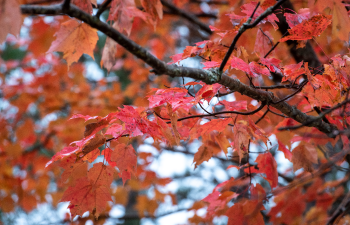 Peak fall color is in the Upper Peninsula right now and heading to Lower Michigan – check out our fall color tour to see where to go for the best “leaf-peeping” opportunities. Peak fall color is in the Upper Peninsula right now and heading to Lower Michigan – check out our fall color tour to see where to go for the best “leaf-peeping” opportunities.
Once the color show is over, here are a few ways to deal with the fallen leaves in your own backyard:
‘Leaf’ them be
What’s the easiest way to deal with fallen leaves? Just leave them alone – they’ll benefit wildlife and save you time and energy. If you’re worried about getting the stink eye from neighbors, you can assure them that the leaf layer is a critical part of the ecosystem. Salamanders, chipmunks, wood frogs, box turtles, toads, insects and other wildlife live in the leaf layer of the forest. Many important pollinators like moths and butterflies overwinter in fallen leaves.
If you’d like to move fallen leaves off your lawn, you can rake them into garden beds (free mulch!) where they will insulate perennials and keep soil in place during storms. Alternately, shred them with a lawn mower and let them become natural fertilizer for the yard.
Make garden gold
Another way to take care of fallen leaves is to collect them in a compost bin and let nature do the rest. They’ll break down into rich soil that plants love. If you have the space, you can also rake them directly into a vegetable patch and till them under in the spring.
A guide published by the Michigan Department of Environment, Great Lakes, and Energy, “Home composting: Reap a heap of benefits” describes how to build and maintain a compost bin.
Burn responsibly
If you choose to burn leaves, here are some important tips for this disposal method.
Before burning, remember to check for a burn permit to see if conditions are safe for burning, and know your local fire ordinances.
If you’re in the Upper Peninsula and northern Lower Peninsula, visit Michigan.gov/BurnPermit or call 866-922-BURN to find out whether burning is allowed. People who live in the southern Lower Peninsula can check with local government or fire departments.
“When burning, always have a water source nearby and never leave a fire unattended, even for a moment,” said Paul Rogers, DNR fire prevention specialist. “Debris burning is the No. 1 cause of wildfire in Michigan.”
It’s okay to burn natural materials such as leaves, branches and logs. It’s not legal to burn plastic or other trash.
Questions about burning? Visit Michigan.gov/BurnPermit or contact Paul Rogers at 616-260-8406. |
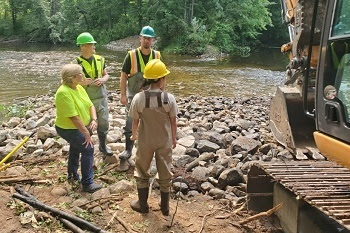 For decades, the remnants of an old mill dam within the community of Parkville have degraded fish habitat and created safety concerns for anglers and kayakers on the Portage River. This stretch of river now has a new look, thanks to a collaborative effort led by the St. Joseph Conservation District and the Michigan DNR. For decades, the remnants of an old mill dam within the community of Parkville have degraded fish habitat and created safety concerns for anglers and kayakers on the Portage River. This stretch of river now has a new look, thanks to a collaborative effort led by the St. Joseph Conservation District and the Michigan DNR.
The rehabilitation of the river was completed this past summer. Numerous metal beams and the crumbling remains of a concrete wall were pulled out of the river, and the existing cobble and boulders at the diversion dam site on the main river were rearranged to form natural-style rapids. The rehabilitated river provides a safer paddling experience and improved habitat for fish and aquatic invertebrates.
Funding for the project was provided by the DNR Fisheries Habitat Grant Program and a mitigation fund created by the City of Sturgis as part of the licensing process for the Sturgis hydroelectric dam on the St. Joseph River. The dam removal was performed by a DNR Parks and Recreation Division heavy equipment crew from the Allegan field office. Several partners contributed materials or services to make the dam removal possible, including Park Township, St. Joseph County Road Commission, Detweiler Excavating, Stark Excavating and the Historical Society of St. Joseph County.
To learn more about how the DNR is managing Michigan’s fisheries for current and future generations, visit Michigan.gov/Fishing.
Questions? Contact Brian Gunderman, 269-251-2645. |
 The DNR’s fiscal year 2022 (Oct. 1, 2021, through Sept. 30, 2022) operating budget, several fisheries orders, preliminary elk hunting season results and several land transactions are just some of the agenda items for the next meeting of the Michigan Natural Resources Commission, scheduled for Thursday, Oct. 14. The DNR’s fiscal year 2022 (Oct. 1, 2021, through Sept. 30, 2022) operating budget, several fisheries orders, preliminary elk hunting season results and several land transactions are just some of the agenda items for the next meeting of the Michigan Natural Resources Commission, scheduled for Thursday, Oct. 14.
The meeting will start at 9 a.m. at Michigan State University’s Veterinary Diagnostic Laboratory, 4125 Beaumont Road, in Lansing. (Note: Masks are required indoors for everyone entering MSU facilities. Learn more at MSU.edu/Together-We-Will.)
See the meeting’s full draft agenda at Michigan.gov/NRC. For more information or to request time to speak at the meeting, contact Su Schrauger at 517-284-6237 or [email protected]. |
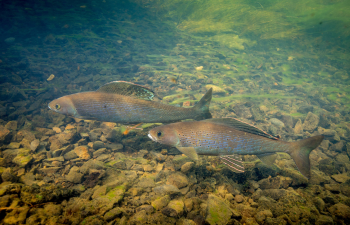 In honor of Indigenous Peoples’ Day, we’re highlighting a partnership focused on improving natural resources in the Great Lakes region – the Michigan Arctic Grayling Initiative. In honor of Indigenous Peoples’ Day, we’re highlighting a partnership focused on improving natural resources in the Great Lakes region – the Michigan Arctic Grayling Initiative.
The Little River Band of Ottawa Indians has engaged in extensive research for potential grayling reintroduction. While the initiative is still in the early stages, we’re excited to see this important species returned to Michigan’s waters.
We’re proud to highlight this foundational partnership between the Michigan DNR and Little River Band of Ottawa Indians as well as recognize other partners contributing to the initiative including the Little Traverse Bay Band of Odawa Indians, the Grand Traverse Band of Ottawa Indians, the Bay Mills Indian Community and the Sault Ste. Marie Tribe of Chippewa Indians.
For more info about the initiative to bring grayling back to Michigan, visit MiGrayling.org. |
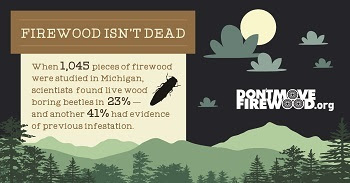 Protect the campsites and wildlife habitats important to you by preventing the spread of forest pests on firewood. Protect the campsites and wildlife habitats important to you by preventing the spread of forest pests on firewood.
In case you missed it, October is firewood month and a good time to think about how and where to get wood. Don’t move firewood from location to location – instead, plan to either gather firewood on-site where permitted or purchase firewood near your camping destination.
Heading out of state? Transporting firewood may violate state and federal laws, depending on the region.
You have the power to slow the spread of forest pests. Remember to:
- Gather firewood on-site where permitted.
- Buy it where you burn it.
- Buy certified, heat-treated firewood.
For more information, visit Don’tMoveFirewood.org. |
|